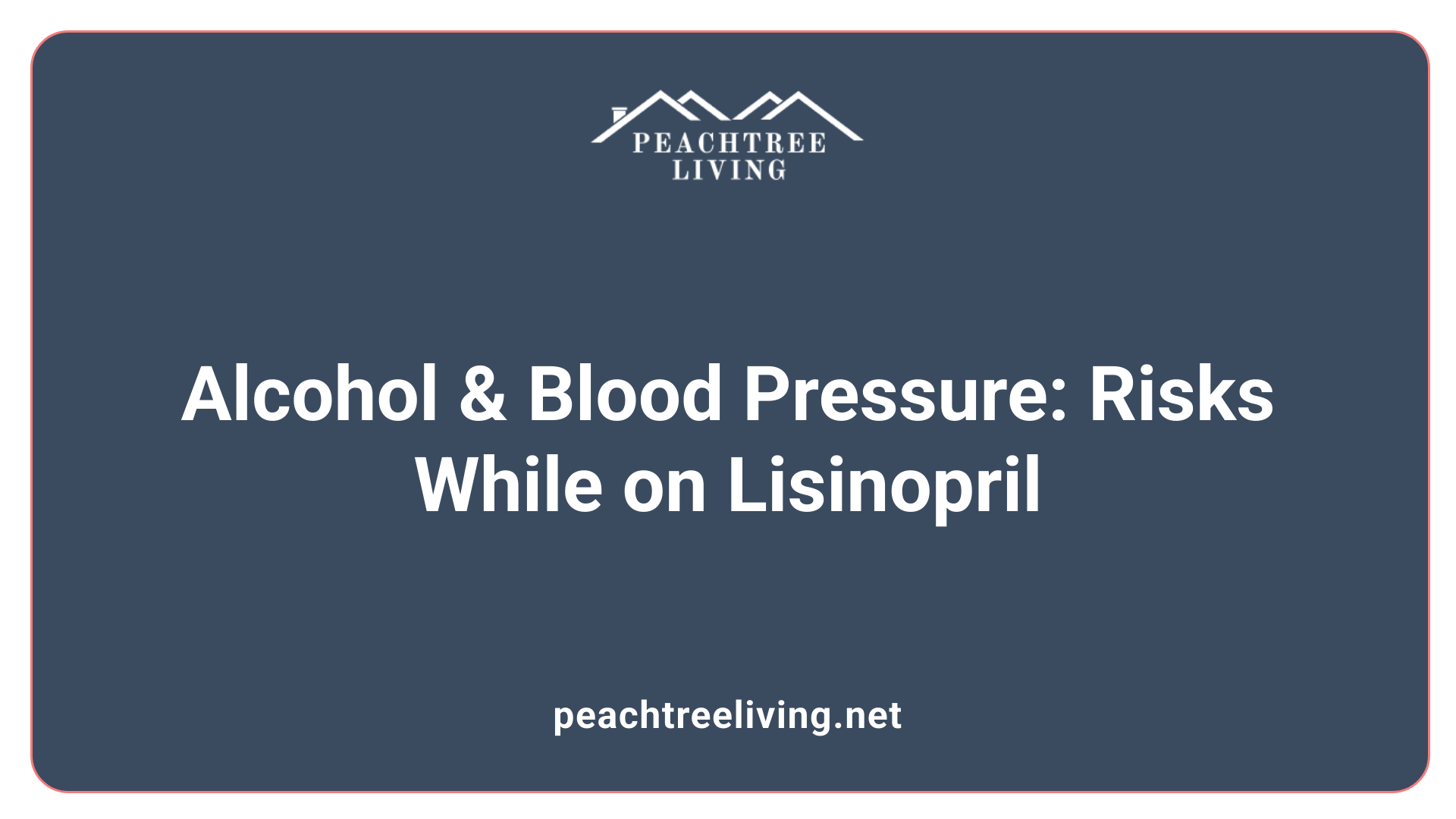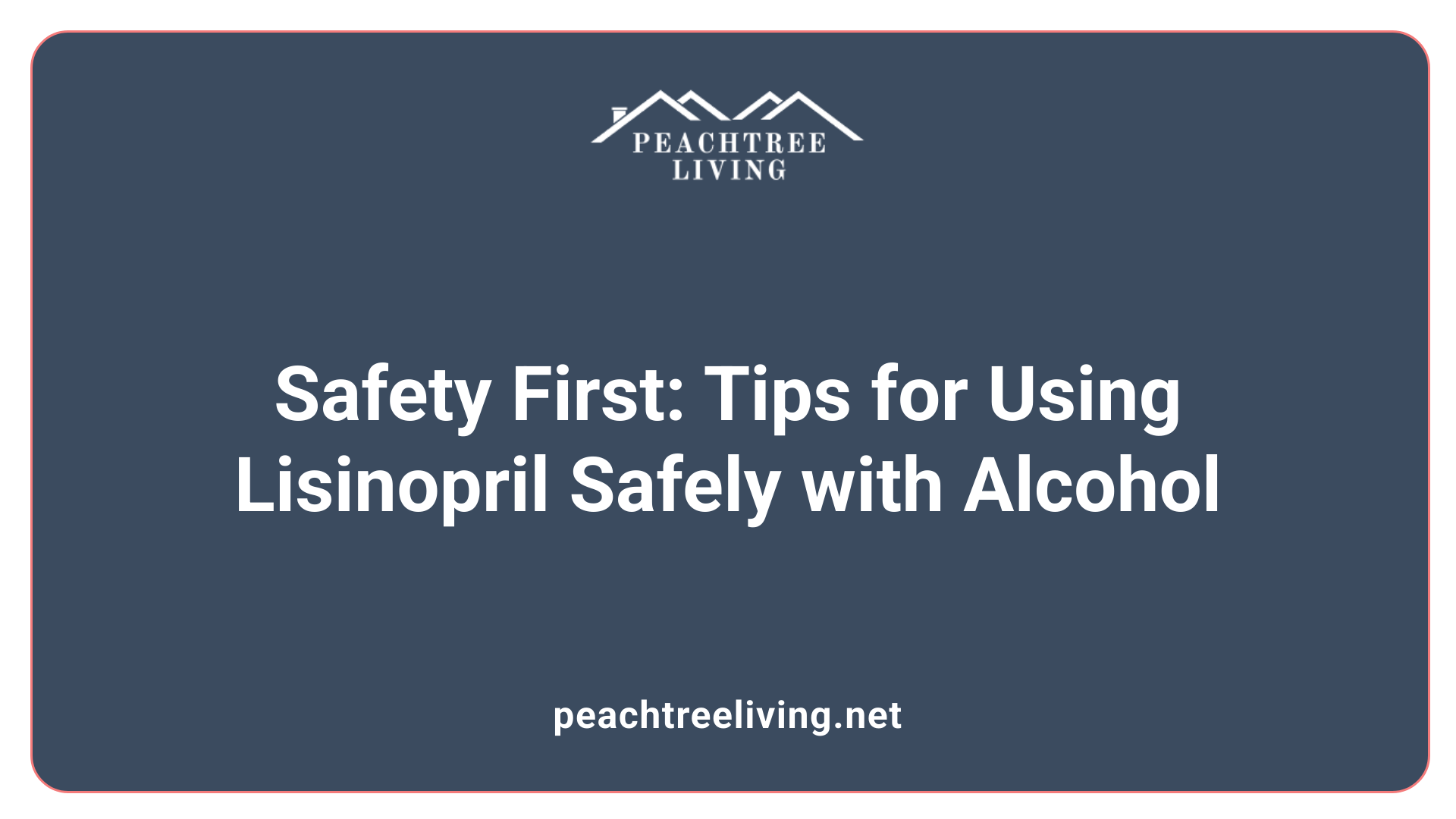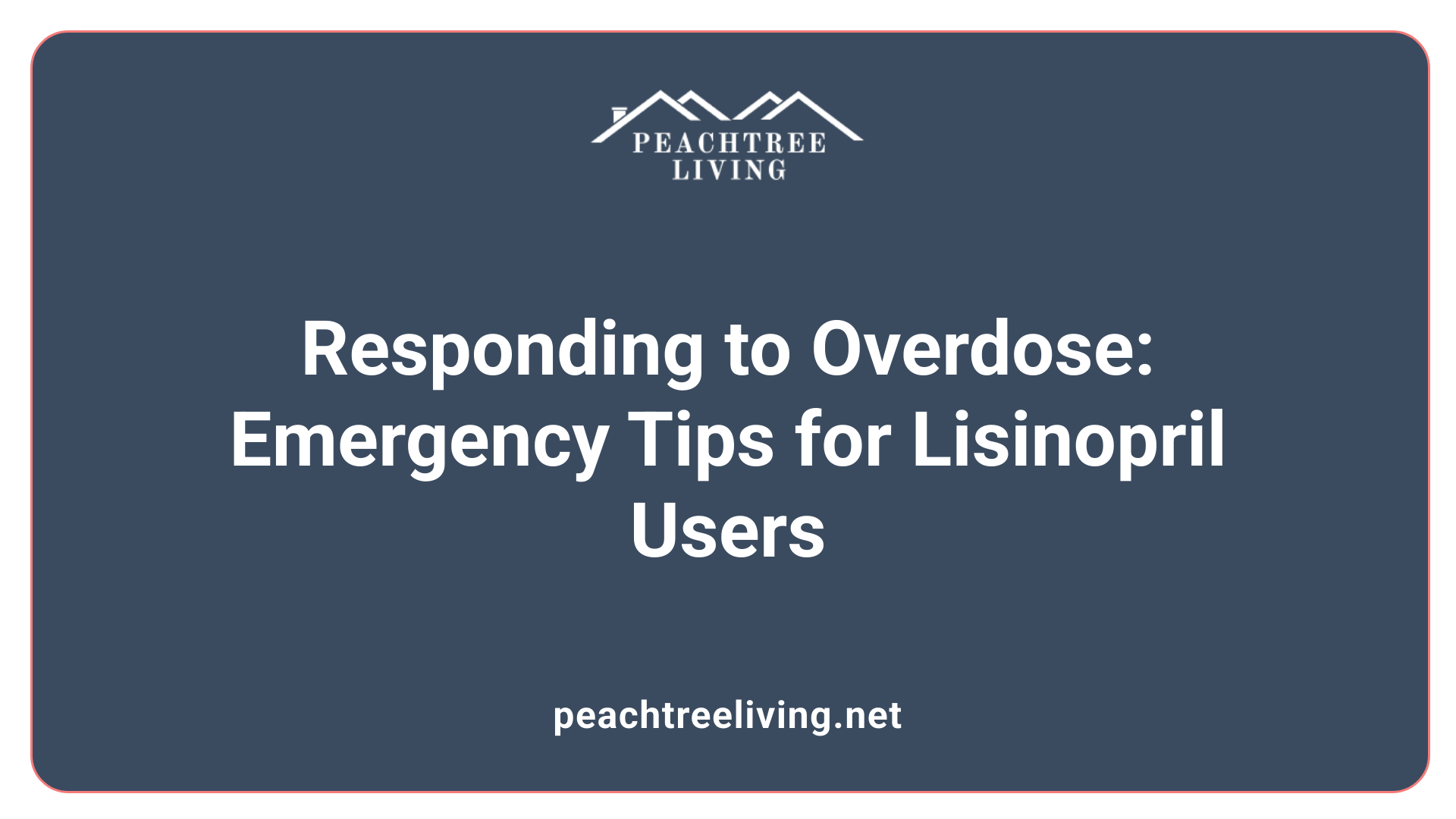Exploring the Risks and Precautions of Combining Alcohol with Lisinopril
Lisinopril is a widely prescribed ACE inhibitor used to manage high blood pressure, heart failure, and protect kidney function in diabetic patients. While effective, its interaction with alcohol raises important health considerations. This article delves into how alcohol impacts lisinopril’s efficacy, the associated health risks, and safety recommendations for patients monitoring their blood pressure through medication.
What is Lisinopril and Its Function?

What is lisinopril and how does it interact with alcohol?
Lisinopril is a medication prescribed for managing high blood pressure, heart failure, and protecting kidney function in diabetics. It belongs to a class known as ACE inhibitors, which help relax blood vessels, making it easier for the heart to pump blood and thereby lowering blood pressure.
Although there is no direct drug interaction between lisinopril and alcohol, health professionals generally advise caution. Alcohol and lisinopril both influence blood pressure and cardiovascular health, and their combined effects can be problematic.
When alcohol is consumed during lisinopril treatment, it can heighten side effects such as dizziness, lightheadedness, and fainting. These symptoms occur because both substances can lower blood pressure, and their combination may lead to dangerously low levels, increasing the risk of falls and injuries.
Alcohol can also impair the body's ability to regulate blood pressure effectively, causing fluctuations that can undermine the medication’s purpose.
It’s recommended to avoid alcohol or consult a healthcare provider for personalized advice. If necessary, moderate drinking is safer, but patients should be aware of the potential risks and symptoms that require medical attention.
How does alcohol affect blood pressure management when taking lisinopril?
Alcohol's impact on blood pressure control is complex. While moderate alcohol intake can temporarily lower blood pressure, excessive drinking typically raises it. When combined with lisinopril, alcohol can interfere with the medication’s ability to maintain healthy blood pressure levels.
Heavy or binge drinking may counteract the effects of lisinopril, leading to unstable blood pressure readings. The additive effects of alcohol and lisinopril can cause blood pressure to dip too low, resulting in dizziness, fainting, or weakness.
Furthermore, alcohol impairs the body’s natural regulation of blood pressure, making it less responsive to medication. This can increase the risk of heart complications, including strokes or heart attacks.
To prevent these risks, healthcare providers usually recommend limiting alcohol intake during treatment. Consistent monitoring and adherence to medical advice are essential for effective blood pressure management.
Can I drink alcohol while taking lisinopril?
The consensus among medical professionals is that it’s best to avoid alcohol during lisinopril therapy. Combining these substances can enhance side effects such as dizziness, fainting, and dehydration, which may lead to dangerous falls, especially in older adults.
Alcohol may also compromise the medication’s ability to control blood pressure, leading to fluctuations that can result in both hypertensive and hypotensive episodes.
Serious health risks include arrhythmias, liver issues, and kidney strain. Because of these potential complications, patients are advised to either abstain from alcohol altogether or discuss their drinking habits with their healthcare provider.
If alcohol consumption cannot be avoided, it should be done in moderation—generally no more than one drink per day for women and two for men—and with close medical supervision. Monitoring blood pressure regularly and being attentive to symptoms like dizziness or irregular heartbeat are important steps.
In summary, while there is no absolute contraindication for moderate alcohol use, the safest approach is to abstain while on lisinopril to optimize treatment outcomes and reduce adverse effects.
Additional considerations
- Patients should inform healthcare providers about all medications and supplements, including alcohol use.
- Avoid salt substitutes high in potassium unless approved by a doctor, as lisinopril can increase potassium levels.
- Lifestyle changes, such as quitting smoking and maintaining a healthy diet, support better blood pressure control.
- Regular blood tests help monitor kidney function and electrolytes during treatment.
Summary Table of Important Points:
| Aspect | Details | Additional Info |
|---|---|---|
| Lisinopril class | ACE inhibitor | Used for hypertension, heart failure |
| Main effect | Relaxes and widens blood vessels | Reduces heart’s workload |
| Side effects | Dizziness, dry cough, high potassium | Requires medical oversight |
| Alcohol interaction | No direct drug interaction | Can worsen side effects and reduce efficacy |
| Drinking advice | Limit or avoid alcohol | Especially when starting or adjusting medicine |
| Risks of alcohol | Heart strain, liver/kidney damage | Especially problematic with high intake |
| Monitoring | Regular blood tests | For kidney function and electrolytes |
| Lifestyle tips | Healthy diet, exercise, no smoking | Supports overall cardiovascular health |
Effects of Alcohol on Blood Pressure Control in Patients on Lisinopril

What is the recommended time to wait before drinking alcohol after taking lisinopril?
It is generally safest to avoid alcohol while taking lisinopril, especially for individuals with cardiovascular conditions. Alcohol can raise blood pressure and pose risks to heart health. Although there is no direct drug interaction between lisinopril and alcohol, drinking alcohol can worsen side effects such as dizziness, low blood pressure, dehydration, and kidney strain. Lisinopril has a half-life of about 12 hours, which means it takes roughly 60 hours (or five half-lives) for the medication to be fully eliminated from your system. Therefore, waiting two to three days after the last dose before consuming alcohol is recommended. However, for personalized guidance, consulting your healthcare provider is crucial, since individual health conditions vary. In all cases, moderation and following medical advice are vital for minimizing potential health risks associated with alcohol consumption while on lisinopril.
Precautions and Safety Tips for Patients on Lisinopril

What precautions should be taken when mixing alcohol with lisinopril?
When mixing alcohol with lisinopril, it is important to exercise extreme caution or ideally avoid alcohol altogether, as the combination can be dangerous. Alcohol can exacerbate side effects of lisinopril such as dizziness, weakness, and blood pressure fluctuations, increasing the risk of fainting, falls, and cardiovascular complications. Consuming alcohol while on lisinopril may lead to unpredictable blood pressure changes, which can be either dangerously low or insufficiently controlled/high, thus compromising treatment effectiveness. The combination may also cause severe adverse effects like gastrointestinal upset, muscle cramps, or even more serious issues such as arrhythmia or liver problems. Therefore, patients should consult their healthcare provider before drinking alcohol and follow medical advice closely to prevent serious health risks.
What health warnings are associated with alcohol and lisinopril?
There are no specific drug interactions or formal warnings about combining alcohol with lisinopril. However, alcohol can worsen conditions treated by lisinopril, such as high blood pressure and cardiovascular disease, because it is toxic to the heart and can cause permanent damage over time. Drinking alcohol while taking lisinopril may increase the risk of side effects like dizziness, fainting, and low blood pressure, especially if consumed heavily or binge drinking occurs. Alcohol can also temporarily raise blood pressure and interfere with the medication's effectiveness, counteracting its therapeutic benefits. It is generally advised to avoid or limit alcohol intake while on lisinopril and to consult your healthcare provider for personalized guidance.
Monitoring blood pressure regularly
Regular monitoring of blood pressure is essential for patients on lisinopril. This helps ensure the medication is effectively controlling blood pressure and highlights any adverse effects early. Patients should measure their blood pressure at home using a reliable device and report any significant fluctuations to their healthcare provider. Increased vigilance is particularly necessary when starting treatment or increasing dosage, as side effects like dizziness or fainting can occur. Keeping a log of blood pressure readings can help healthcare professionals make informed decisions about ongoing therapy.
Consulting healthcare providers before alcohol intake
Patients should always consult their healthcare provider before consuming alcohol while taking lisinopril. While there is no direct drug interaction warning, alcohol can potentiate the blood pressure-lowering effects of lisinopril, leading to risks such as dizziness, fainting, and falls. Heavy drinking or binge episodes pose even higher risks, including severe hypotension and damage to the heart and kidneys. Healthcare providers can offer personalized advice based on your overall health, kidney function, and other medications. It is typically recommended to limit alcohol consumption or abstain entirely to avoid compromising treatment and safeguarding health.
Avoiding salt substitutes high in potassium
Patients on lisinopril should avoid salt substitutes that are high in potassium, such as Lo-Salt, as these can dangerously increase potassium levels in the blood (hyperkalemia). High potassium can cause heart rhythm disturbances, muscle weakness, and in severe cases, cardiac arrest. Since lisinopril itself can raise potassium levels by reducing the kidneys’ ability to excrete it, combining it with potassium-rich salt substitutes amplifies this risk. Regular blood tests to monitor potassium levels are advised, especially if dietary habits change or other medications affecting potassium are introduced. Patients should discuss with their healthcare provider before using any potassium-containing products or supplements.
Additional safety tips
- Be aware of symptoms such as dizziness, fainting, chest pain, or swelling around the face, which warrant immediate medical attention.
- Avoid driving or operating machinery if you experience dizziness or blurred vision.
- Continue routine follow-up visits for kidney function tests and blood pressure checks.
- Maintain a heart-healthy lifestyle: quit smoking, eat a balanced diet, exercise regularly, and manage stress.
- Inform all healthcare providers about lisinopril use before any surgery or anesthesia.
| Aspect | Recommendation | Why It Matters |
|---|---|---|
| Regular blood pressure monitoring | Check blood pressure routinely at home or clinic | Ensures effective control and early detection of side effects |
| Alcohol intake | Consult provider, limit or avoid drinking | Prevents adverse effects, maintains medication efficacy |
| Key dietary considerations | Avoid potassium-rich salt substitutes | Prevents hyperkalemia and cardiac risks |
| Recognizing adverse effects | Seek immediate care for severe dizziness, swelling, chest pain | Essential for avoiding serious health complications |
| Lifestyle modifications | Incorporate healthy habits: no smoking, balanced diet | Enhances overall cardiovascular health |
Remaining vigilant and adhering to medical advice can greatly reduce risks associated with lisinopril and improve long-term health outcomes.
Management of Overdose and Serious Side Effects

Can you overdose on lisinopril, and what should you do if you experience severe side effects?
Yes, it is possible to overdose on lisinopril. An overdose typically presents with symptoms such as severe low blood pressure (hypotension), dizziness, elevated levels of potassium in the blood (hyperkalemia), and in some cases, kidney failure, bradycardia (slow heart rate), or lethargy. Recognizing these signs early is crucial for prompt treatment.
Treatment of a lisinopril overdose mainly involves supportive care. Medical professionals may administer intravenous fluids to stabilize blood pressure and ensure proper hydration. Monitoring vital signs frequently helps assess the patient's condition.
In cases where blood pressure remains dangerously low despite fluids, vasopressors—medications that constrict blood vessels and raise blood pressure—may be used. When traditional vasopressors do not work, evidence suggests that intravenous angiotensin II can be effective, as it directly counteracts the effects of ACE inhibitors.
Additionally, naloxone, commonly used in opioid overdoses, has been shown to help reverse severe hypotension in some cases involving lisinopril overdose.
Patients experiencing severe symptoms should seek immediate medical attention. Hospitalization might be necessary for close monitoring and advanced treatments, such as gastrointestinal decontamination if ingestion was recent, or dialysis in extreme cases. Quick intervention can prevent long-term organ damage and stabilize the patient.
Overall, awareness of overdose symptoms and prompt responses are vital to managing this emergency successfully.
What are the potential health risks associated with mixing alcohol and blood pressure medications like lisinopril?
Mixing alcohol with blood pressure medications such as lisinopril can lead to serious health risks. One of the most immediate concerns is the risk of dangerously low blood pressure (hypotension), which can cause dizziness, fainting, and an increased chance of falls or injuries. Alcohol's depressant effects on the central nervous system amplify these symptoms and can impair judgment and coordination.
Additionally, alcohol may interfere with how lisinopril is metabolized in the body, potentially reducing its effectiveness in controlling blood pressure. This interaction may lead to poor management of hypertension, increasing the risk of heart attack, stroke, or other cardiovascular events.
Heavy or binge drinking can further complicate matters by causing fluctuations in blood pressure—initially raising it with binge drinking and later lowering it below safe levels—thus undermining the medication's benefits.
Alcohol also affects the cardiovascular system directly by increasing the risk of arrhythmias and myocardium stress. Moreover, since both lisinopril and alcohol impact liver and kidney functions, their combination can strain these organs, possibly leading to liver damage or kidney impairment over time.
Considering these potential dangers, it is essential for individuals on blood pressure medications to consult healthcare providers before consuming alcohol. Most doctors recommend limiting or avoiding alcohol to prevent adverse effects and to ensure the medication's effectiveness. Keeping alcohol intake moderate, or abstaining altogether, can significantly improve treatment outcomes and reduce health risks.
Ensuring Safe Use and Effective Treatment
While lisinopril remains an effective medication for managing hypertension and safeguarding heart and kidney health, the interaction with alcohol necessitates caution. Given alcohol’s potential to counteract lisinopril’s effects and increase the risk of adverse side effects, patients are advised to limit alcohol consumption and always seek personalized medical guidance. Regular monitoring of blood pressure and kidney function, combined with informed choices about alcohol intake, can help optimize treatment outcomes and safeguard long-term health. Prioritizing safety and open communication with healthcare professionals is essential for effective blood pressure management.
References
- Lisinopril and Alcohol: Interactions, Effects & Risks
- Common questions about lisinopril - NHS
- Can I Drink Alcohol While Taking Blood Pressure Medicine Like ...
- Lisinopril and Alcohol/Food Interactions - Drugs.com
- Lisinopril and Alcohol: Interactions and Side Effects to Know - K Health
- Lisinopril and alcohol: Interaction and side effects - SingleCare
- Alcohol And Lisinopril Interaction - Northstar Behavioral Health
- Lisinopril & Alcohol - Is it Safe? - Transcend Recovery Community
- Hydrochlorothiazide/lisinopril and Alcohol/Food Interactions

